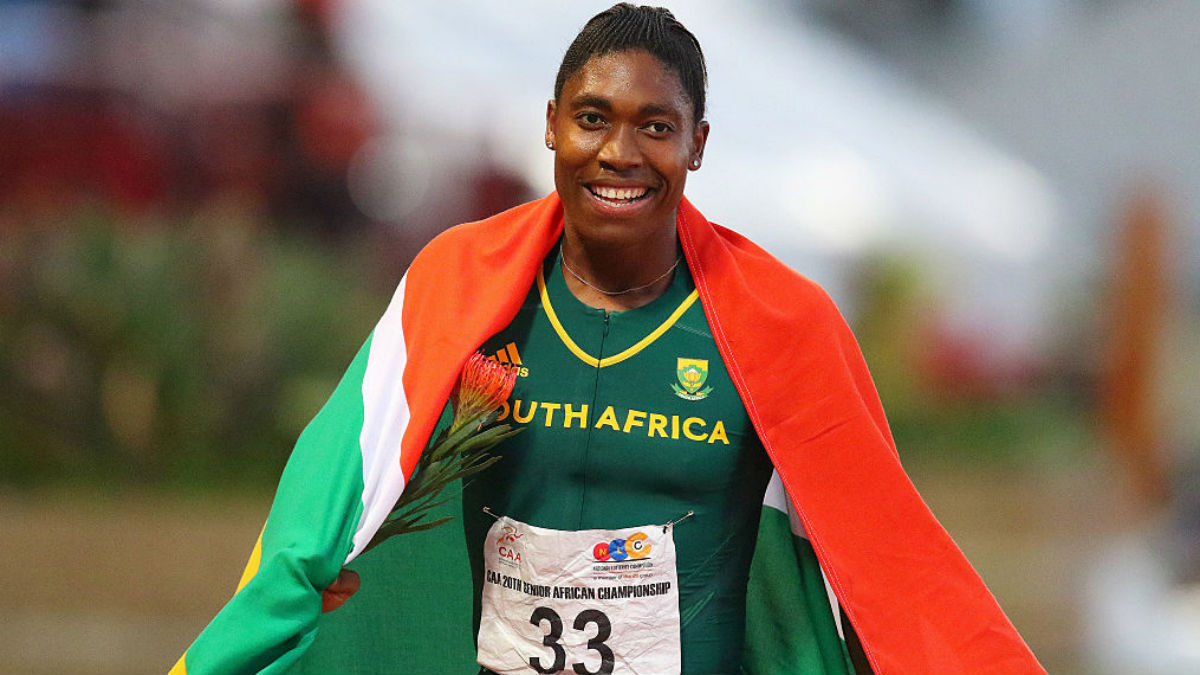Caster Semenya case ‘threatens to destroy women’s sport’
The Olympic champion is appealing against new rules for ‘hyperandrogenic’ competitors

A free daily email with the biggest news stories of the day – and the best features from TheWeek.com
You are now subscribed
Your newsletter sign-up was successful
A legal battle by South African runner Caster Semenya to overturn proposed eligibility rules for hyperandrogenic athletes is threatening to “destroy women’s sport”, according to a top lawyer.
The International Association of Athletics Federations (IAAF) has suggested that hyperandrogenic athletes - those with “differences of sexual development” (DSD) - should have to medically lower their testosterone levels below a prescribed amount before being allowed to compete.
The track and field global governing body wants to introduce the rule changes in order to promote what it says will be fairer competition, arguing that current rules “could lead to athletes with differences of sexual development (DSD) and transgender athletes ‘dominating the podiums and prize money in sport’”, reports The Guardian.
The Week
Escape your echo chamber. Get the facts behind the news, plus analysis from multiple perspectives.

Sign up for The Week's Free Newsletters
From our morning news briefing to a weekly Good News Newsletter, get the best of The Week delivered directly to your inbox.
From our morning news briefing to a weekly Good News Newsletter, get the best of The Week delivered directly to your inbox.
But 800-metre Olympic champion Semenya - the most high-profile athlete who would be affected by the proposed rule change - is challenging the legality of the IAAF’s proposals in a case being heard at the Court of Arbitration (CAS) in the Swiss city of Lausanne this week.
Her lawyers say she is “unquestionably a woman” and as such, intends to fight for her right to compete internationally without “unnecessary medical intervention”.
That argument is being challenged by prominent sports lawyer Jonathan Taylor QC, who claims that if Semenya wins her case, the future of a wide range of women’s sports will be threatened.
“Without restriction, athletes with DSDs have set more than 100 records at national, continental and world level, the competition is not fair, the playing field is not level,” he told Sky News.
A free daily email with the biggest news stories of the day – and the best features from TheWeek.com
“If Caster wins her case the IAAF will have to let people compete in female categories based on their legal sex which these days can be a matter of choice,” Taylor continued.
“That means that you will have people with testes and high male levels of testosterone competing in the female categories and that will mean women with ovaries and low levels of testosterone have no chance of winning.”
Nevertheless, some commentators say such advantages and disadvantages are often simply the luck of the draw.
Women “who race against intersex athletes have every reason to feel that the competition is unfair”, but “equally, swimming against Michael Phelps - who genetics blessed with a freakishly-long torso - is also unfair”, says The Times’ Tom Whipple.
High-level sport “is full of people with a genetic advantage, and once you go down the route of correcting for the more extreme cases it is difficult to know where to stop”, he adds.
Semenya’s appeal case comes as tennis great Martina Navratilova faces widespread condemnation for saying that allowing transgender women to compete in women’s sport is “insane”.
“It’s insane and it’s cheating. I am happy to address a transgender woman in whatever form she prefers, but I would not be happy to compete against her. It would not be fair,” Navratilova wrote in an article for The Sunday Times.
Dr Rachel McKinnon, the first transgender woman to win a cycling track world title, posted several tweets hitting out at Navratilova’s “ignorant” remarks.
“Martina Navratilova is explicitly peddling a transphobic MYTH of the duplicitous cis man ‘faking’ being a trans woman in order to gain access to women-only spaces for nefarious purposes,” McKinnon said.
-
 Health insurance: Premiums soar as ACA subsidies end
Health insurance: Premiums soar as ACA subsidies endFeature 1.4 million people have dropped coverage
-
 Anthropic: AI triggers the ‘SaaSpocalypse’
Anthropic: AI triggers the ‘SaaSpocalypse’Feature A grim reaper for software services?
-
 NIH director Bhattacharya tapped as acting CDC head
NIH director Bhattacharya tapped as acting CDC headSpeed Read Jay Bhattacharya, a critic of the CDC’s Covid-19 response, will now lead the Centers for Disease Control and Prevention
-
 Epstein files topple law CEO, roil UK government
Epstein files topple law CEO, roil UK governmentSpeed Read Peter Mandelson, Britain’s former ambassador to the US, is caught up in the scandal
-
 Iran and US prepare to meet after skirmishes
Iran and US prepare to meet after skirmishesSpeed Read The incident comes amid heightened tensions in the Middle East
-
 Israel retrieves final hostage’s body from Gaza
Israel retrieves final hostage’s body from GazaSpeed Read The 24-year-old police officer was killed during the initial Hamas attack
-
 China’s Xi targets top general in growing purge
China’s Xi targets top general in growing purgeSpeed Read Zhang Youxia is being investigated over ‘grave violations’ of the law
-
 Panama and Canada are negotiating over a crucial copper mine
Panama and Canada are negotiating over a crucial copper mineIn the Spotlight Panama is set to make a final decision on the mine this summer
-
 Why Greenland’s natural resources are nearly impossible to mine
Why Greenland’s natural resources are nearly impossible to mineThe Explainer The country’s natural landscape makes the task extremely difficult
-
 Iran cuts internet as protests escalate
Iran cuts internet as protests escalateSpeed Reada Government buildings across the country have been set on fire
-
 US nabs ‘shadow’ tanker claimed by Russia
US nabs ‘shadow’ tanker claimed by RussiaSpeed Read The ship was one of two vessels seized by the US military